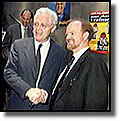Cook Sees Britain As Key Player in Europe
The new Foreign Secretary, Robin Cook, has arrived back in London after a visit to Paris and Bonn. He made clear his intention to make Britain one of the three biggest players in Europe, alongside France and Germany.
On his first trip abroad in his new job, Mr Cook told his French counterpart, Herve de Charette, that conflict with Britain was a thing of the past.
At a news conference in Paris, Mr Cook said Britain wanted to work closely with France and Germany. In a major step towards closer cooperation, all three countries have agreed to press for a global ban on landmines.
"It is our commitment that we will draw a line under the sterile, negative and fruitless confrontation which was the policy of the previous British Government," he said.
Mr Cook, aware that the socialist parties in France and Germany were boosted by Labour's landslide victory in Britain, began the day in talks with French Socialist Opposition leader Lionel Jospin.
The French left has been greatly encouraged by Labour's victory as it prepares for parliamentary elections on 25 May and 1 June. However, the French right has retorted that Labour won the election by junking socialist ideas and adopting the principles of the free market.
The Foreign Secretary was careful not to take political sides, insisting it was for the French nation to choose a new government in elections which begin later this month, and for the new government in Britain to work with whichever party came to power in Paris.
"Britain wants to be one of the three major players in Europe," he declared before joining the current French foreign secretary for talks on EU affairs over lunch.
"We have had a very warm exchange of views," he said afterwards. "We have found a good deal of common ground and we have agreed on further work together. This is an excellent start to our new relationship."
Inspiration
In Bonn, Mr Cook met the German Foreign Minister, Klaus Kinkel, and opposition leaders, including the leader of the German Social Democrats (SPD), Oskar Lafontaine. The SPD, which has spent the last sixteen years in opposition, is looking to the Labour Party for inspiration as it organises for a general election next year.
Mr Kinkel praised Labour's landslide victory and said London and Bonn had common stands on free trade and the need for strong ties with the United States. But, at a joint news conference, he rejected suggestions that Britain was joining the French-German partnership to form a "tripartite group" leading unity efforts in Europe.
"I want today to be the start of a new era between Britain and the leading members of Europe," Mr Cook told journalists. "It is our intention that Britain should now be one of those leading members, not a country on the sidelines seeking to be obstructive."
|

